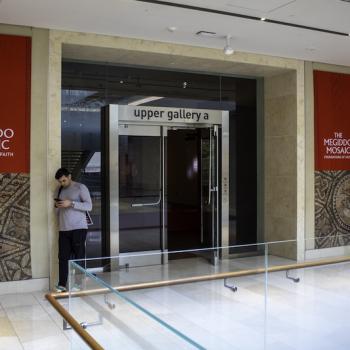Lectionary Reflections
Luke 10:25-37
July 14, 2013
My colleague Roy Heller who teaches Old Testament Interpretation and Hebrew at Perkins School of Theology tells his students in his Introduction to the Old Testament classes: "Don't confuse familiarity with understanding." It's great advice, especially with parables we've all heard many times before and assume we understand completely.
We are quite familiar with the traditional boiling down of this parable's message to an example story: Don't be like this. Be like this. "Don't be self-righteous; assuming God can't work through people you look down on. Instead be like the Samaritan, helping those you meet each day who need your help."
There is some truth there. But the familiar interpretation doesn't squeeze out all the blood still left in this turnip. I am convinced that Jesus' parables are attempts to answer the question "What is the kingdom of God like?" One answer is "It shows up where you least expect it." When we approach it that way, see if any new details in the landscape appear. The context of the parable is a question to Jesus from a student of Torah (a lawyer) in Luke 10:25-28. The lead-in to the parable tells us that the lawyer "stood up to test Jesus" (10:25). Some interpreters assume he doesn't really want to know the answer, but that he just wants to test the teacher or stand out in the crowd. They give him no benefit of the doubt. They lump him together with the self-righteous people to whom Jesus tells the story of the Pharisee and the tax collector in Luke 18:9. Or they group him with the spies who try to trap Jesus in the question about the lawfulness of paying taxes to Caesar in Luke 20:20-26. (Luise Schottroff, The Parables of Jesus, 132-33)
But what if the lawyer had mixed motives? What if, in addition to wanting to test Jesus, his questions are motivated by a desire to be directed by him? What if this Torah student actually wants to know the answer to the question "What must I do to inherit eternal life?" Or what if he wants to hear what he knows is the answer from the Torah confirmed on the lips of one whom many look up to as their teacher? Jesus asks his question back to him, assuming that, as a student of Torah, he should already know the answer. The lawyer answers with the command to love God and neighbor from Deuteronomy 6:5 and Leviticus 19:18. Jesus affirms his answer and tells him that if he does this he will live.
Then the lawyer asks a follow-up question, the text says, "because he wanted to justify himself." If one wants to "justify themselves," they want to be perceived as good and just, to be viewed as guiltless and righteous, to be approved and accepted. The lawyer wanted Jesus' acceptance and approval. He wanted to stand out from the crowd in Jesus' estimation.
I have found over the years that students will go to great lengths to gain the teacher's approval. Any teacher will tell you, though, that the best way a student can impress a teacher is by doing the readings, knowing the material, and being able to talk about its practical impact on daily life. Students still sometimes resort to other means. They may bring the teacher food items that she has mentioned in passing as her favorites. I hasten to say that, while I enjoyed the apple fritters and the peanut M&Ms, I have never requested such items or so much as implied that placing them in my campus mailbox would improve a student's grade! Sometimes students ask if they can do extra credit work if their last assignment received a poor grade. They may come to class early to help set up the chairs. If they come in late while the class is discussing this week's readings, they may immediately jump in and try to contribute to the conversation, never mind that they haven't done the readings, because class participation is 10 percent of the final grade.
Another way students try to gain a teacher's approval is by asking what they regard as a nuanced, subtle question in class, which, they hope will reveal their intellectual depth. I wonder why the lawyer felt a need to justify himself to Jesus. And I wonder what answer he was hoping for to his question "Who is my neighbor?" A list of categories of people he needed to try to love as he loved himself, the shorter the better? Is the lawyer a human being like the rest of us who wants to know the bare minimum the syllabus requires to pass the course?
If it is true that the kingdom of God shows up where we least expect it, and I believe that it is, then maybe we meet it first in the gap between our knowing what God requires of us with regard to our fellow human beings and our willingness to do it. Maybe our fear that we are falling short is an entry point for the kingdom of God in our lives. The lawyer, thanks to Jesus' interpretation of Torah, is confirmed in what he was afraid was true. That is, that entering into the kingdom of God and inheriting eternal life means a wholehearted, single-minded devotion to God that overflows from our hearts, minds, souls, and strength in practical, loving deeds done on behalf of our fellow human beings. This is an assignment that no syllabus can contain, that is not done to impress a teacher but to express the love of God.





